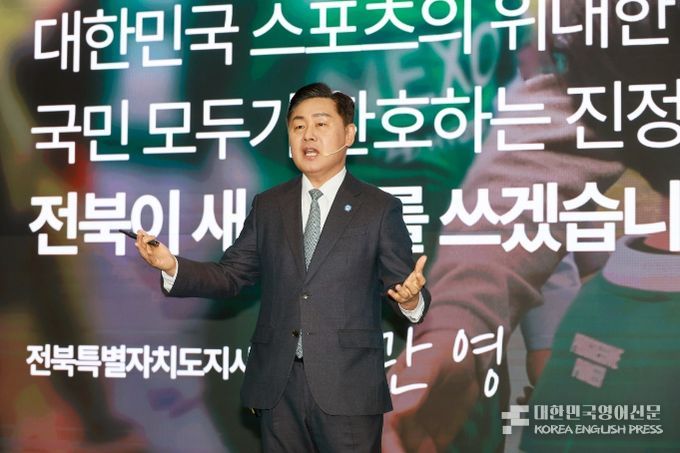
The Jeonbuk Special Self-Governing Province has finally been confirmed as the Korean bid for the 2036 Summer Olympics. A total of 61 delegates voted at the Korean Sports Federation's regular delegates' assembly on Aug. 28, with Jeonbuk winning with 49 votes, Seoul with 11 and one invalid vote. This is a historic moment for the balanced development of the country and a step toward raising the international profile of Jeonbuk. Years of preparation, systematic strategy, and active participation by the people of Jeonbuk have come to fruition, and the province has the opportunity to become a global sports center.
Jeonbuk's Olympic bid was not a short-term endeavor. In June 2023, the first step was taken with the start of the '2036 Olympic Bid Feasibility Study'. Since then, it has continued to prepare thoroughly by analyzing sports facilities and financial resources for hosting international competitions (May 2024) and conducting a brief survey on the suitability of Olympic facilities (July 2024).
In September 2024, when the Korea Sports Federation announced the announcement of the selection of the Korean candidate city for the 2036 Summer Olympics, Jeonbuk responded immediately. On November 12 of the same year, it submitted its bid to the Korea Olympic Committee and officially became a candidate city.
The Jeollabuk-do Special Self-Governing Province, which touted a strategy of solidarity among non-metropolitan areas, also marked a turning point in the country's balanced development by receiving approval for the use of major facilities (November 2024) after consulting with Gwangju, Jeonnam, Chungnam, Chungbuk, and Daegu. Governor Kim Young-rok of Jeonnam, Governor Kim Tae-heum of Chungnam, Mayor Kang Ki-jeong of Gwangju, and Mayor Hong Jun-pyo of Daegu also demonstrated their solidarity by declaring their support for Jeonbuk's Olympic bid via video during the presentation review at the Korea Sports Federation's Delegate Assembly on the 28th.
Publicity campaigns were also actively carried out to spread participation and empathy among residents. Through the 'GBCH Challenge' (Go Beyond, Create Harmony), people of all ages participated in supporting the bid, and the appointment of ambassadors, social media promotions, painting contests, performances by the National Choir and Taekwondo cultural performances further enhanced the atmosphere of the bid. The month-long challenge, which began in January, attracted more than 500 participants from all walks of life, including overseas Koreans.
Bidding for the 2036 Summer Olympics is expected to play an important role in the economic and social growth of the Jeonbuk region. It is expected to revitalize the local economy by expanding road and rail networks, building and renovating sports facilities, and improving tourism infrastructure. In addition, Jeonbuk's international recognition is expected to be enhanced by welcoming athletes and tourists from around the world.
Earlier, the Jeonbuk Research Institute analyzed the economic effects of hosting the 2036 Summer Olympics using industry linkage tables published by the Bank of Korea. As a result, it was calculated that the production induced effect would be KRW 40.4 trillion nationwide and KRW 27.9 trillion in Jeonbuk, the added value induced effect would be KRW 17.8 trillion nationwide and KRW 12.9 trillion in Jeonbuk, and the employment induced effect would be 449,000 people nationwide and 374,000 people in Jeonbuk.
“The selection of Jeonbuk as a national candidate for the Olympics is an achievement made together with the people of the province,” said Kim Kwan-young, governor of Jeonbuk Special Self-Governing Province. ”We will return to our roots and work together with the people of the province and solidarity cities to compete internationally.” “We will do our best to ensure that Jeonbuk is selected as the host city for the 2036 Summer Olympics,” he said.
Jeonbuk will submit an 'International Event Hosting Plan' to the Ministry of Culture, Sports and Tourism, and after receiving approval from the Ministry of Culture, Sports and Tourism and the Ministry of Strategy and Finance, will begin full-scale bidding activities in cooperation with the Korea Sports Federation.
After submitting a letter of intent to the International Olympic Committee (IOC), the bid will be evaluated by the IOC Future Bid Commission. After that, a city will be recommended for prioritized negotiation through the review of the Future Bids Commission, and finally, the host city will be decided through a vote at the IOC Session.
Currently, other international cities hoping to host the Games are also in the running. More than a dozen countries, including India, Indonesia, Saudi Arabia, Qatar, Turkiye, and Egypt, are in the running. India is looking to expand beyond its capital city, while Indonesia is aiming to host the first Olympics in Southeast Asia. Saudi Arabia, host of the 2030 World Expo, and Qatar, which successfully hosted the 2022 World Cup, are also strong contenders.
[News Source: Jeonbuk Special Self-Governing Province]























